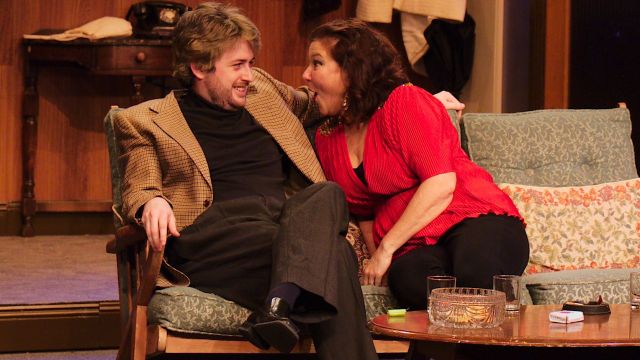Who’s Afraid of Virginia Woolf?
This iconic work by Edward Albee is a play of its time. When it opened in 1962, it was acclaimed as the play that would lead a revolution in American playwriting. But because it dared to portray a picture of American life that was less than ‘wholesome’, it was also criticised by those who found it “obscene, morbid and decadent”. Yet the play took its place as the harbinger of a new wave of theatre that did what theatre is meant to do … reflect society and question prevailing values and behaviour.
Set on a college campus, it takes the audience back to a time in America when changing social values and behaviour affected even the privileged. Littered with literary and historical allusions, the dialogue is at one moment almost poetic, at another raw and biting.

With her usual attention to detail, Carla Moore’s production is true to the text and the time. Dramaturg Phaedra Nicolaids has provided the cast and the audience with a comprehensive study of major events of the decade and a detailed ‘glossary’ of the many allusions. The set and the costumes define the period clearly. There is no attempt to bring this play into the present. It is set fairly and squarely when it was written – and its message is just as powerful in the hands of this very strong director and very competent cast.
All the characters are supposed to be well-educated people who should be ideal citizens – even at 2am after a faculty party. As they continue drinking, their behaviour becomes more confronting, more revealing, and more destructive. From the very beginning the tension is taut, stretching more and more tightly as the characters scratch at each other, peeling away layers, revealing lies and illusions, exposing weaknesses and failings.
Martin Bell is outstanding as George, the harried history academic who has not achieved the promotions that were expected of him. Bell finds all the complexities of the character – his intelligence, his charm, his superficial bravado, his underlying frailty, his cutting wit – with a naturalness that makes the character very real.
Alison Chambers plays his disillusioned wife Martha. This is a physically and emotionally demanding role that Chambers fulfills extremely well. She sets the initial tension of the play and accelerates it as she moves from manipulating wife, to inebriated hostess, to flirtatious tease. She taunts George constantly, pushing the tenseness of their relationship until eventually they lay bare the delusion that is their life – and she is left, exhausted and bereft.
 Matt Bevan is Nick, the newly appointed young Biology lecturer who is rather bemused by an invitation to party on at 2am – but ambitious enough to accept. Bevan takes Nick through a range of reactions as the situation gets more complicated, allowing himself to be taken in by George’s niggling and Martha’s encouragement.
Matt Bevan is Nick, the newly appointed young Biology lecturer who is rather bemused by an invitation to party on at 2am – but ambitious enough to accept. Bevan takes Nick through a range of reactions as the situation gets more complicated, allowing himself to be taken in by George’s niggling and Martha’s encouragement.
His quiet, ‘mousey’ wife, Honey, is played very nicely by Emily McKnight. She innocently accepts George and Martha for what they seem to be, completely unaware of the emotional storm that is brewing around her. As she is plied with brandy, she becomes less and less controlled, and McKnight does the ‘tipsy’ Honey very well.
Moore has developed this production as almost a tribute to the play itself and its place in theatre history. Despite the inherent social criticism and the shallowness and fragility of the characters, this is an entertaining and thought-provoking piece of theatre.
Carol Wimmer
Subscribe to our E-Newsletter, buy our latest print edition or find a Performing Arts book at Book Nook.

